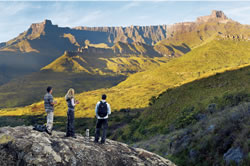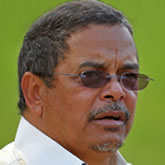Durban, KwaZulu-Natal
Durban is South Africa’s second most important economic metropolitan region and is one of the country’s most popular leisure destinations. It is a sophisticated, cosmopolitan city of more than three million people and its mix of cultures – African, Asian and European – Is reflected in a mosaic of architectural styles and a melting pot of traditions and colourful cuisine. Its privileged location on the Eastern seaboard makes it South Africa's only destination offering warm winters and tropical summers and it boasts 320 sunny days a year.


Durban's attractive, sweeping beaches are complemented by rejuvenation evident along the seafront, such as the huge uShaka Marine World theme park. Whale-watching, wreck-diving, fishing, kite surfing and luxury cruises are amongst the myriad of attractions scraping the city's edge.
The greater Durban area is tropical, green and lush with vistas of sugar cane fields to the north incorporating Umhlanga and Umdloti, valleys and gorges to the west, Indian Ocean to the east, and seaside villages to the south as far as Umkomaas.
Durban’s modern infrastructure meets international standards and the city is intent on further rapid development in order to maintain its status as an internationally competitive and desirable business, sports and leisure destination. In addition, the city offers a highly sophisticated communications infrastructure, including fibre optics and broadband. The city also has a well-established transport system which includes the King Shaka International Airport, a new international airport that provides world-class facilities for passenger travel and freight transfer.
Durban has generated a wealth of experience in dealing with the safety and security requirements surrounding high-profile conferences. It boasts its own City Metro Police, a service which supplements the country’s national police force. Security is further enhanced through the use of sophisticated technology, inclusive of CCTV surveillance cameras. In addition, the Durban Metro Police dedicated 16 Peace Officers in and around the Inkosi Albert Luthuli ICC Complex. The skills and experience gained during the FIFA World Cup™ will be invaluable for application during future global events hosted by Durban.
Some of Durban’s core attractions include:
- Moses Mabhida Stadium: A proud host of the semi-finals in the 2010 FIFA World Cup™, this state-of-the-art stadium is a world-class sports venue capable of accommodating 70 000 sports fans.
- Our beaches: Durban is a coastal city and home to some of the most beautiful beaches in the country. The warm waters of the Indian Ocean are shark-protected, ensuring safe swimming, surfing and scuba diving along the vast stretches of golden sands.
- The Point Waterfront: This unique development is transforming the area surrounding the harbour entrance by creating a business and residential boom within the city centre with its beautiful buildings and complexes.
- uShaka Marine World: Durban’s uShaka Marine World incorporates the fifth largest aquarium in the world, uniquely designed within a shipwreck theme and offers visitors both an educational and entertaining experience. Shows with dolphins, seals and penguins are conducted daily at designated times.
- KwaZulu-Natal Sharks Board: The only one of its kind to be found anywhere in the world, the Sharks Board closely monitors the activities of one of the most controversial predators all along the coastline.
- Bird parks: Durban is home to the Umgeni River Bird Park, where bird enthusiasts and novices alike may enjoy viewing a wide variety of different bird species in a first-class, natural environment.
- Golf courses: Golf enthusiasts are spoiled for choice in Durban and the city hosts one of the top 20 golf courses in the world at the Durban Country Club.
- Museums: Durban’s museums bring history to life for its visitors, providing an insight into life in the city—from its first settlers through the apartheid era to today.
- It is also possible to learn about Durban’s architectural and nautical history. The Port Natal Maritime Museum, Old Court House Museum, KwaMuhle Museum and the Old House Museum take visitors through the ages of Durban.
- Markets: Durban is home to many markets which provide a perfect showcase for South Africa’s entrepreneurial spirit. Handmade arts and crafts are available for sale, providing visitors with a unique reminder of their visit to the city. Arts and crafts markets may be found on the city’s beachfront and at the Bat Centre on the harbour edge.
- Shopping: The city provides a wide spectrum of retail shopping - from authentic traditional to top designer goods. The largest shopping complex in South Africa, the Gateway Theatre of Shopping, in Umhlanga, north of the city, has much more to offer its patrons than the average shopping centre. With more than 300 stores, a wide range of restaurants, an outdoor Wave House and Skate Park, Barnyard Theatre, 18 movie theatres, as well as an IMAX cinema and Fantasy Forest game arcade, visitors to Gateway have an array of choices.
- Cuisine and restaurants: Durban’s cuisine is as varied as its people. It reflects the wide cross section of Durban’s diverse cultures, from east to west and, particularly, the traditional tastes of Africa. Durban abounds with quality restaurants, fast-food outlets, roadside vendors and laid-back pavement cafes, providing a truly international selection of foodstuffs to suit every palate.
- Rejuvenation: Durban is home to many outstanding beauty and health spas.
- Places of worship: Durban is a cosmopolitan city where different cultures and religions co-exist. Christian, Hindu, Muslim and traditional African beliefs are practised. The city centre is home to the gilded splendour of the largest mosque in the southern hemisphere—the Grey Street Mosque, and contrasts with the brick and stone of the Roman Catholic Cathedral situated nearby. Chatsworth, on the outskirts of Durban, is home to the Temple of Understanding, a spectacular piece of architecture that sees three gold and white domes gracing the skyline.
Sources: WFC2015 Bid Book, Durban KwaZulu-Natal Convention Bureau, Durban Tourism, African Agenda.
The host province: KwaZulu-Natal
KwaZulu-Natal is one of South Africa’s most important economic hubs and tourism provinces, renowned for its conservation efforts, natural attractions and prehistorical and historical sites. Some of its key natural attractions include:
- The uKhahlamba Drakensberg Park;
- ISimangaliso Wetland Park World Heritage Sites;
- Game reserves such as the Hluhluwe uMfolozi—South Africa’s oldest game reserve where the white rhino was saved from extinction;
- Some of KwaZulu-Natal’s most fascinating historical sites at battlefields such as Blood River, Isandlwana, Rorke’s Drift, Talana, Colenso and Spioenkop;
- Tembe Elephant Park, which reportedly has the biggest elephant population in Africa; and The Drakensberg Mountains, a World Heritage Site renowned for their rock art and evidence of the early San people or Bushmen.
KwaZulu-Natal also has a rich cultural mix, which ranges from the cultures of one of the biggest Indian population concentrations outside mainland India to the famous Zulu people and communities from European ancestry. The region is also associated with famous personalities such as Mahatma Ghandi, Winston Churchill, John Dube, Albert Luthuli, Nelson Mandela and Alan Paton. Mahatma Ghandi, for example, spent much of the more than 20 years that he lived in South Africa at his “ashram” in Phoenix, which forms part of a unique tourism route known as the Inanda Heritage Route. This route also includes the Ohlanga Educational Institute and home of Reverend John Dube, the first president of the African National Congress (ANC). This is the site where Nelson Mandela cast his first vote and went on to report to Rev. Dube, at his gravesite in the grounds of this institute, that “We are finally free”. The moment also represented the end of former President Mandela’s “long walk to freedom”.
KwaZulu-Natal is also proud of our beach culture, with a range of world-class beaches, internationally recognised surf spots and shark-diving reefs. This rich heritage and tourism environment will assist in ensuring that delegates to the XIV World Forestry Congress not only have a rich, meaningful meeting, but an experience that provides them with a better understanding of this African region.
Download Travellers Tips here
Sources: WFC2015 Bid Book, Durban KwaZulu-Natal Convention Bureau, Durban Tourism, African Agenda.










